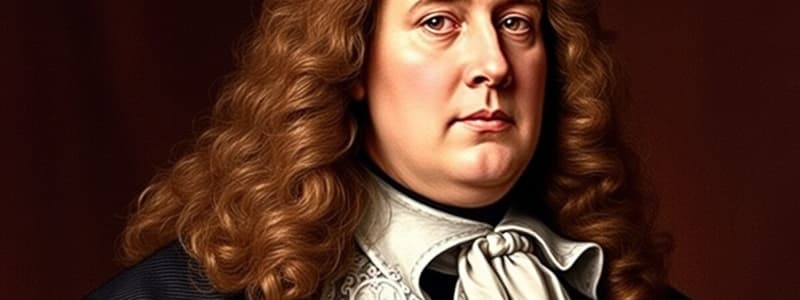Podcast
Questions and Answers
What core principle, deeply rooted in his Quaker beliefs, significantly shaped William Penn's approach to governance and societal structure in Pennsylvania?
What core principle, deeply rooted in his Quaker beliefs, significantly shaped William Penn's approach to governance and societal structure in Pennsylvania?
- Equality and religious freedom. (correct)
- Militaristic defense strategies.
- Economic policies favoring the wealthy elite.
- Strict social hierarchy based on birthright.
How did William Penn's personal experiences with the English prison system influence his decisions regarding penal reform in Pennsylvania?
How did William Penn's personal experiences with the English prison system influence his decisions regarding penal reform in Pennsylvania?
- He designed a prison system emphasizing reform over punishment. (correct)
- He sought to replicate the English prison system in Pennsylvania.
- He advocated for prisons focused solely on punishment.
- He implemented harsher punishments to deter crime.
How did William Penn's interactions with Native Americans differ from those of many other colonial leaders during his time?
How did William Penn's interactions with Native Americans differ from those of many other colonial leaders during his time?
- He treated them with respect, learning their language and negotiating for land. (correct)
- He sought to convert them to Christianity using forceful methods.
- He disregarded their land claims and seized territory by force.
- He refused to engage with them, maintaining strict segregation.
What was the primary reason behind the King of England granting William Penn a large tract of land in colonial America?
What was the primary reason behind the King of England granting William Penn a large tract of land in colonial America?
Which of the following best describes the significance of the Charter of Liberties drafted by William Penn in 1682 for the Pennsylvania settlement?
Which of the following best describes the significance of the Charter of Liberties drafted by William Penn in 1682 for the Pennsylvania settlement?
In what way did Pennsylvania's establishment differ from that of many other colonies regarding religious tolerance?
In what way did Pennsylvania's establishment differ from that of many other colonies regarding religious tolerance?
What motivated William Penn to learn the language of the Lenape people when negotiating for land in Pennsylvania?
What motivated William Penn to learn the language of the Lenape people when negotiating for land in Pennsylvania?
Why were the Quakers often at odds with the monarchy in England during the mid-1600s?
Why were the Quakers often at odds with the monarchy in England during the mid-1600s?
What distinguishing feature characterized William Penn's approach to meetings and negotiations with Native American groups, as depicted in the artistic rendering?
What distinguishing feature characterized William Penn's approach to meetings and negotiations with Native American groups, as depicted in the artistic rendering?
How did William Penn's vision for Pennsylvania's penal system depart from the conventional approach to punishment during his time?
How did William Penn's vision for Pennsylvania's penal system depart from the conventional approach to punishment during his time?
Which geographic designation was used to describe the region that included Pennsylvania, New York, New Jersey and Delaware during the colonial era?
Which geographic designation was used to describe the region that included Pennsylvania, New York, New Jersey and Delaware during the colonial era?
What specific concept did William Penn term Pennsylvania, underscoring its unique societal experiment centered on Quaker ideals?
What specific concept did William Penn term Pennsylvania, underscoring its unique societal experiment centered on Quaker ideals?
What fundamental aspect of governance did Penn's Quaker convictions heavily influence in the establishment of Pennsylvania's colonial government?
What fundamental aspect of governance did Penn's Quaker convictions heavily influence in the establishment of Pennsylvania's colonial government?
What action did William Penn reportedly take in 1682 to formally acknowledge the Lenape Native American group's claim to the land within his colony?
What action did William Penn reportedly take in 1682 to formally acknowledge the Lenape Native American group's claim to the land within his colony?
What key provision was included in the Charter of Liberties drafted by Penn, showcasing his commitment to safeguarding individuals from potential governmental overreach?
What key provision was included in the Charter of Liberties drafted by Penn, showcasing his commitment to safeguarding individuals from potential governmental overreach?
How did the Quakers' belief in equality directly challenge the existing social order in 17th-century England?
How did the Quakers' belief in equality directly challenge the existing social order in 17th-century England?
What specific alternative did William Penn seek to introduce in Pennsylvania's prison system, diverging from the conventional use of dungeons prevalent in English prisons?
What specific alternative did William Penn seek to introduce in Pennsylvania's prison system, diverging from the conventional use of dungeons prevalent in English prisons?
What action symbolized William Penn's commitment to fostering positive relations with Native Americans, contrasting with the practices of many other colonial leaders?
What action symbolized William Penn's commitment to fostering positive relations with Native Americans, contrasting with the practices of many other colonial leaders?
What factor played a crucial role in King Charles II's decision to grant William Penn a significant land grant in America?
What factor played a crucial role in King Charles II's decision to grant William Penn a significant land grant in America?
What fundamental principle, integral to William Penn's vision, was enshrined in the Charter of Liberties, reflecting his dedication to safeguarding individual liberties?
What fundamental principle, integral to William Penn's vision, was enshrined in the Charter of Liberties, reflecting his dedication to safeguarding individual liberties?
Flashcards
Who was William Penn?
Who was William Penn?
Writer, thinker, and colonial leader who founded Pennsylvania.
Who were the Quakers?
Who were the Quakers?
A religious group with strong beliefs that angered the English monarchy.
How did Penn acquire Pennsylvania?
How did Penn acquire Pennsylvania?
The King of England repaid a debt to Penn's father with land in colonial America.
What was unique about Pennsylvania?
What was unique about Pennsylvania?
Signup and view all the flashcards
What did Penn's charter guarantee?
What did Penn's charter guarantee?
Signup and view all the flashcards
What was Penn's approach to prisons?
What was Penn's approach to prisons?
Signup and view all the flashcards
How did Penn acquire land from Native Americans?
How did Penn acquire land from Native Americans?
Signup and view all the flashcards
How did Penn show respect to Native Americans?
How did Penn show respect to Native Americans?
Signup and view all the flashcards
What was Penn's approach to negotiations?
What was Penn's approach to negotiations?
Signup and view all the flashcards
What principles guided Pennsylvania's government?
What principles guided Pennsylvania's government?
Signup and view all the flashcards
What was the original name of Pennsylvania?
What was the original name of Pennsylvania?
Signup and view all the flashcards
What were England's middle colonies?
What were England's middle colonies?
Signup and view all the flashcards
Study Notes
- William Penn (1644-1718) was a writer, thinker, and colonial leader.
- He is known for founding the colony of Pennsylvania.
- Penn supported laws that respected religious freedom.
- He encouraged egalitarian government policies.
- Penn treated Native American groups more fairly.
Establishing the colony of Pennsylvania
- William Penn was part of the Quakers, a devout religious group.
- Quakers held beliefs that angered the monarchy in England.
- Quakers believed in equality, asserting that even the king was no better than anyone else.
- In the mid-1600s, the British persecuted and imprisoned William Penn and his fellow Quakers for their writings and beliefs.
- Penn came from a powerful family.
- The King of England owed Penn's deceased father a large sum of money.
- In 1681, the King's Council repaid the debt to young Penn.
- The debt was repaid with a land grant in colonial America.
- The land grant eventually became a colony called Pennsylvania, meaning "Penn's Woods".
- Pennsylvania became the first colony to welcome Quakers escaping persecution in England.
- Pennsylvania was part of a growing region known as England's middle colonies, including New York, New Jersey, and Delaware.
Ideas about government
- Penn's Quaker convictions about equality and religious freedom became central tenets of Pennsylvania's colonial government.
- He called Pennsylvania his "Holy Experiment."
- In 1682, Penn drafted a charter of liberties for the new settlement.
- The charter guaranteed fair trial by jury, freedom of religion, freedom from unjust imprisonment, and free elections.
- Penn designed a prison system that emphasized reform instead of relying solely on punishment.
- The torment he experienced in English prisons inspired Penn to want to replace dungeons with workhouses.
Relations with Native Americans
- Penn recognized that the land he acquired in the royal charter was occupied by the Lenape Native American group.
- In 1682, Penn reportedly signed an agreement paying the Lenape for their land.
- Penn treated Native Americans with more respect than many other colonial leaders did.
- He made a point of learning their language to negotiate without interpreters.
- Penn did not bring weapons to meetings, unlike many of his contemporaries.
- An artistic rendering of the purchase negotiation between Penn and the Lenape leaders is displayed in the Rotunda of the United States Capitol in Washington, D.C.
- William Penn is pictured in the center offering payment to the Lenape leaders in the rendering.
- The mural was painted by Constantino Brumidi in 1878.
Studying That Suits You
Use AI to generate personalized quizzes and flashcards to suit your learning preferences.




